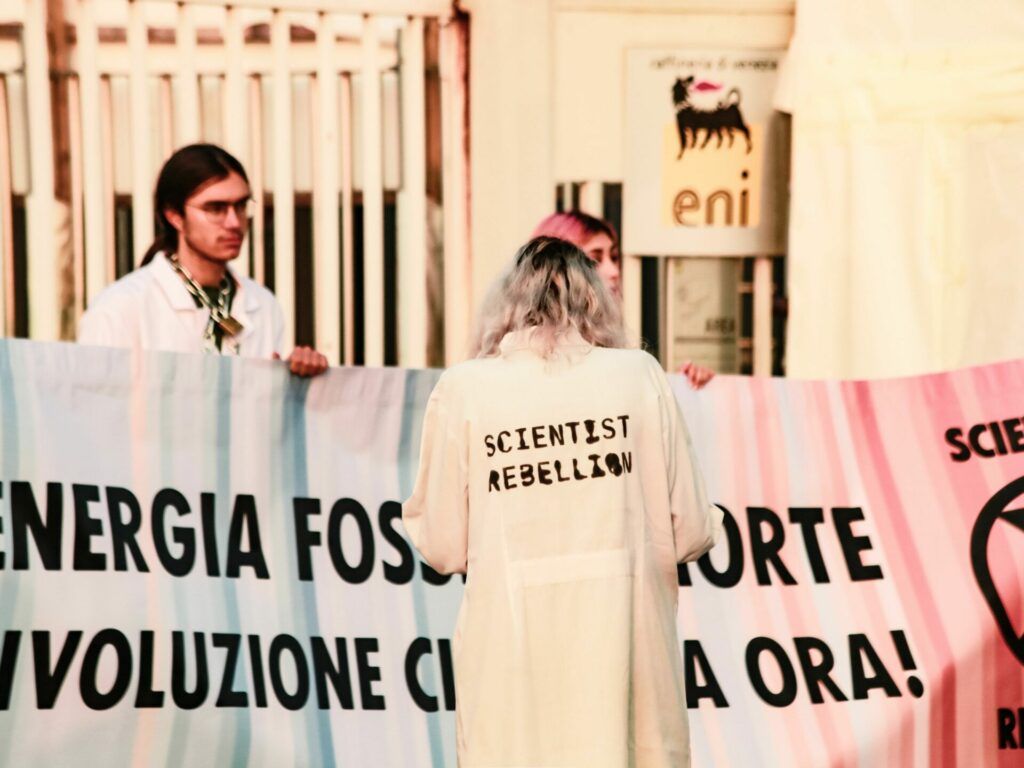Inside the global rebellion of scientist-activists agitating for climate action
By Gabriele Di Donfrancesco | August 31, 2022
 Members of Scientist Rebellion protest outside a biofuel refinery owned by the largest Italian energy company, Eni, in Porto Marghera, Venice. (Photo: Scientist Rebellion)
Members of Scientist Rebellion protest outside a biofuel refinery owned by the largest Italian energy company, Eni, in Porto Marghera, Venice. (Photo: Scientist Rebellion)
Amid the escalating climate crisis, many scientists are leaving their desks and the insular world of academia to join the ranks of a global movement for climate action: the Scientist Rebellion. How “rebellious” the scientists-activists can be depends on where they live. Strategies may vary, from blockading oil refineries to building environmental awareness from scratch in places where the environment is still not on the political agenda. But in a world in which contributions to global warming have been unequal, the people most affected are often those who know the least about it.
Scientist Rebellion members believe in civil disobedience, and even claim to apply the scientific method to their activism. “We believe that science should be communicated for what it is and that scientists have the duty to tell the truth,” Gianluca Grimalda, 50, an Italian researcher in Social Psychology at the Kiel Institute for the World Economy in Germany and spokesperson for the group, explained. “The present failure to communicate hard climate science in its stark reality has led to a dangerous acquiescence with the idea that business as usual will in the end lead to some breakthrough technology that will keep us out of the hole.”
Scientist Rebellion was started in 2020 by two people in the United Kingdom, but gained traction in November 2021, at the 26th United Nations Climate Change conference in Glasgow. “This is when I joined,” Grimalda said. “I was looking for a way to get engaged. I saw by chance there was some protest organized by Scientist Rebellion, so I decided to join as a supporter. After that, I recorded the livestream of the next action in front of the Scottish Power company headquarters, and since then I have become more and more engaged. Recently, I have taken part in what we call a ‘high risk action,’ which means we can get arrested for it.”
Over 1,000 scientists in over 25 countries worldwide took disruptive, non-violent actions and engaged in civil disobedience targeting governmental, scientific and corporate institutions to highlight the urgency and injustice of the climate and ecological crisis. 1/ pic.twitter.com/YCSj7DEKqJ
— Scientist Rebellion (@ScientistRebel1) April 7, 2022
At the Scottish Power headquarters last year, five activists glued themselves to the building after pasting scientific papers on the walls showing the scale of climate change. Scientist Rebellion also accused Scottish Power of green capitalism and greenwashing, particularly for being involved in the dispossession of indigenous communities in the Isthmus of Tehuantepec, Mexico, to make space for wind-energy investments. Police took the activists into custody to clear the area.
This happened in a rich and free country committed to reducing its net emissions in line with the Paris agreements. But in many countries in the Global South, where the luxury to protest is not as widely available or much more dangerous, the scientist-activists are resorting to different strategies to tell the truth about global warming.
“We are all engaged in similar battles against climate change,” said Moinina Koroma, 25, who has a bachelor’s degree in rural development studies at the Njala University in Sierra Leone and is the local spokesperson for the movement. “Our actions go well beyond the capital to reach the poorest of the poor and listen to the voices of the unheard.” Koroma joined the movement in February 2022, along with other African students from the field of environmental studies. He now works to educate farmers and the local youth about climate change and to promote solutions in rural communities and schools.
In Africa, where the risk of being incarcerated for political activism is higher than in the Global North, much of the action involves raising awareness and promoting sustainable development goals. Koroma says there are only 15 other African members of Scientist Rebellion. “The only ones that can save Africa are Africans,” he said. “That is why we need to actually speak with them.”
Though rural communities may have different priorities, climate change is behind many of the issues they are facing, from land and water pollution to desertification and even income inequality.
in Sierra Leone, an teach-in event with several stakeholders generated engagement and calls for climate action to policy makers. 9/ pic.twitter.com/7qVadZ3UbD
— Scientist Rebellion (@ScientistRebel1) April 7, 2022
“Many people are in denial about what is happening,” Koroma said. That may be true on many levels. African countries are indeed looking at exploiting their natural resources as the fastest way to bolster their economies, and citizens may believe that environmental regulations could harm their promised future of prosperity. All the while, higher fossil fuel demand and prices driven by the Ukrainian war have made new oil and gas leases even more attractive.
In a document recently leaked by The Guardian, the African Union outlined a plan to push for a wider exploitation of the continent’s fossil fuel reserves in November at the 27th United Nations Climate Change conference. African climate diplomats furiously scrapped the proposal in a meeting at Addis Ababa on August 4, but it will not halt current plans for new ventures.
At the end of July, the Democratic Republic of Congo auctioned exploratory oil drilling rights for a rainforest area of roughly 59 million acres stretching along the Congo River. Greenpeace Africa opposes the decision and compared it to a “global climate catastrophe” that would destroy vast stretches of pristine ecosystems and contaminate a national park. The auction came less than a year after Congo’s President Felix Tshisekedi vowed to protect the region’s rainforests. According to the New York Times, the nation’s lead on climate issues, Tosi Mpanu Mpanu, bluntly stated that the country’s main objective was to fight poverty and boost the economy. “Our priority is not to save the planet,” Mpanu said.
Support for these initiatives can vary among the local populations, but many just do not have the means to understand the gravity of the situation, Koroma explained.
“We have educational gaps, but some just don’t believe that mankind has anything to do with climate change,” he said. “Most people depend on natural resources for their livelihoods, so you cannot go to these people calling for a stop of their activities. We have to bring alternatives. And we are definitely making no progress. We look at Scientist Rebellion to help us fill that gap and become a platform for people to understand their needs, receive assistance, and learn to negotiate with the government, so that we can boost the economy while controlling the environmental aspects.”
Apart from climate education, Koroma works on projects involving tree planting and plastic waste management. The latter, he said, is his biggest concern at the moment, “since plastic usage is rising all around Africa.” He is also the founder of a youth-led organization called Green Leone, which addresses climate and environmentally related issues in Sierra Leone. Scientist Rebellion provides a platform to share knowledge and research materials in support of the project. “Since we are an organization that shares a similar path, we lead Scientist Rebellion’s actions here at a local level,” Koroma said.
In Europe, where the risk of incarceration is less and climate change is an issue more widely understood, Gianluca Grimalda’s experience with the group is very different.
“In April we took action against Eni, the main Italian energy company, blocking the entrance of the biofuel refinery in Porto Marghera, Venice,” Grimalda said. “We demanded a public meeting to discuss Eni’s industrial plans that involve more investments for fossil fuels and very little for renewable energies.” Eni did not grant the meeting.
“There is this myth that we will be climate neutral by 2050 and that it is going to be fine, but as critical scientists we know that this is not going to be enough,” Grimalda said, referred to what Kevin Anderson, director at the Tyndall Centre for Climate Change Research, called the ‘Principle of common but differentiated responsibilities.’ According to this principle, high-income countries should decarbonize earlier than low income countries. “The horizon for countries like Italy then is not 2050 but 2030,” said Grimalda. “The carbon budget for the North of the world is already negative. It is time to give something back.” That is why Scientist Rebellion supports the “Debt for Climate” campaign, which calls for the cancellation of debts in the Global South, under the commitment that those nations keep fossil fuels in the ground. “That should be uncontroversial,” Grimalda said. “This is what we wanted from Eni too.”
Eni is an Italian multinational company and one of the largest oil and gas producers in the world. Activists have long accused Eni of greenwashing, and the company still has numerous fossil fuel investments. In 2020, the Italian Competition and Market Authority fined Eni €5 million for falsely advertising its diesel fuel as “green and renewable.” Today, Eni advertises in nearly every Italian medium, newspapers and televisions included, sponsors major public events, and positions itself as an important source for money in the media market.
“About 1,200 people were involved in our mobilization in April, mostly supporters, while in Italy there are 40 close members of Scientist Rebellion,” Grimalda said. “Many of our actions can be considered arrestable offenses. For something like what we did in Venice, students in a blockade at La Sapienza University in Rome were taken into custody.” They were then sued for “interruption of public service,” which can result in up to 7 years in prison and a fine of €3,000.
Can scientists have better leverage in climate public negotiations, compared with other activists? Yes and no. “Human brains have many stress-coping mechanisms,”Grimalda explained. “One is climate denial. We saw it with COVID, too. Now that we start experiencing the effects of heat waves and flooding, we can hope that people are more persuaded to act. Scientists are one of the most trusted institutions, even more than journalists. That is why I decided to join the movement. I do think that our commitment is important.”
Some members of Scientist Rebellion are also part of Extinction Rebellion and Ultima Generazione (which recently blocked Rome’s main highway). All three groups are funded by the Climate Emergency Fund, which pledges money to sustain climate activism around the world.
“It is very important that we create a critical mass of people around us,” Grimalda said. “We want to talk to other scientists, but also society. In the Theory of Social Change, even a minority can be enough to trigger major transformations.”
“We need everybody on board: scientists, activists, students,” Koroma agreed. “What we are fighting for is real and we have to take action.”
Together, we make the world safer.
The Bulletin elevates expert voices above the noise. But as an independent nonprofit organization, our operations depend on the support of readers like you. Help us continue to deliver quality journalism that holds leaders accountable. Your support of our work at any level is important. In return, we promise our coverage will be understandable, influential, vigilant, solution-oriented, and fair-minded. Together we can make a difference.
















For Scientist Rebellion to have authentic moral force, shouldn’t its main activists actually work in scientific jobs or at least hold scientific qualifications. I don’t think researchers in social psychology or holders of bachelor’s degrees in rural development studies qualify.